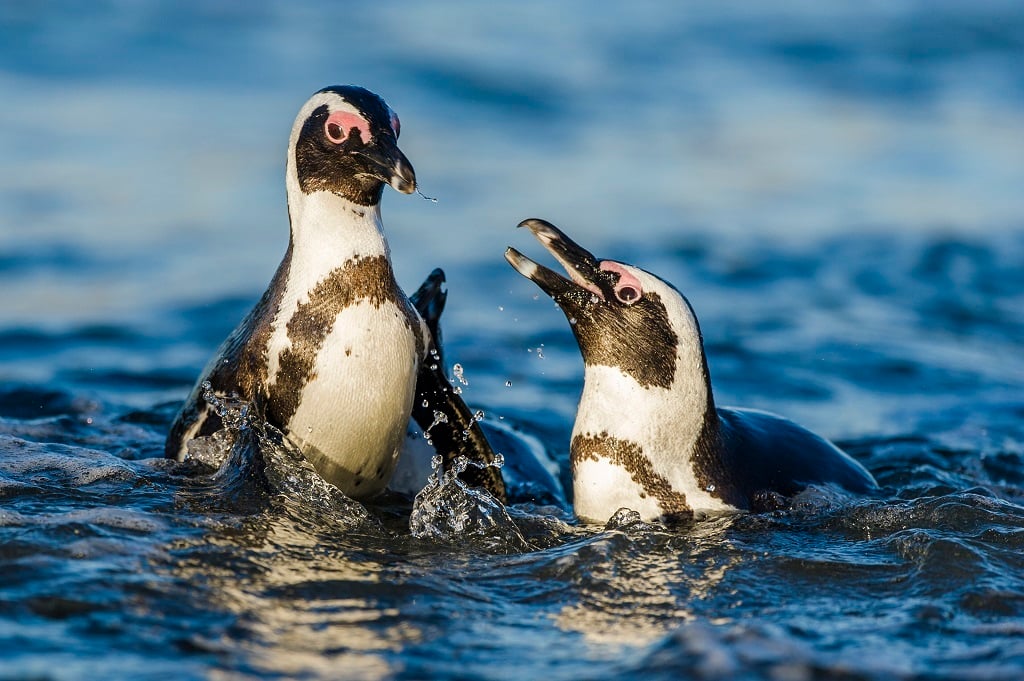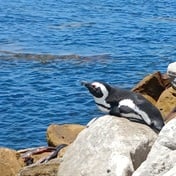
- Ship-to-ship bunkering should not be allowed in Algoa Bay in order to save the endangered African penguin, say conservationists.
- There have been four oil spills linked to bunkering in Algoa Bay, three of which have led to the oiling of birds.
- A study shows that increased noise pollution from maritime traffic since 2016 has seen an 85% decline in the seabird population.
- For climate change news and analysis, go to News24 Climate Future.
Ship-to-ship refuelling in Algoa Bay in the Eastern Cape poses a threat to the endangered African penguin, and conservationists want the public to lend their voice to stop the bunkering.
The Southern African Foundation for the Conservation of Coastal Birds (SANCCOB), in a statement, has implored the public to play their part in protecting the marine life, especially the African penguin, in Algoa Bay, by submitting comments on a draft environmental risk assessment and management plan for the bunkering.
Ship-to-ship bunkering involves the supply of fuel from one ship to another – at sea or not within a harbour.
"Ship-to-ship bunkering is a process of refuelling ships at sea, avoiding port levies and securing a faster turnaround time, more significantly, it is a process that is effectively eradicating a variety of endangered species inhabiting Algoa Bay," SANCCOB said.
The draft environmental risk assessment and management plan is compiled by Nemai Consulting on behalf of Transnet National Ports Authority (TNPA), which manages eight commercial ports in the country. The document acknowledges that there are environmental risks to ship-to-ship refuelling poses, such as oil spills.
Four oil spills have occurred since 2016, when bunkering was first introduced in South Africa. According to SANCCOB, three of these oil spills led to the oiling of birds.
An oil spill in 2019 led to a moratorium on the issuance of new bunkering licences. SANCCOB fears that if the environmental risk assessment and management plan is accepted – then the moratorium on issuing new licences will be lifted and intensify bunkering, and therefore, the risks to marine life in the area.
READ | African birds declining, some face extinction - study
The environmental risk assessment and management plan indicated that TNPA and the South African Maritime Safety Authority have received applications from companies to carry out ship-to-ship fuel transfers within the Port of Ngqura in the Eastern Cape.
The port also happens to be close to St Croix Island, in Algoa Bay, where, until recently, the largest breeding colony of the African penguin in the world is found. However, the population of the seabird has declined so severely that the island no longer holds this status.
While TNPA puts forward that the environmental management plan sets out a response to environmental and maritime safety risks, SANCCOB said that the best mitigation would be to stop the ship-to-ship refuelling from happening near any endangered seabird colony.
SANCCOB has also raised concern over the "vortex of destructive consequences" for marine life in Algoa Bay that would result from bunkering. Apart from the endangered African penguin and vulnerable Cape Gannet, Algoa Bay hosts a variety of marine biodiversity, including cetaceans like whales, dolphins and seals.
Noise pollution
Other environmental impacts include noise pollution.
A 2022 study shows that since ship-to-ship bunkering was implemented in 2016, Algoa Bay saw marine traffic in the area double along with higher underwater noise pollution.
"This increase coincided with a significant and dramatic decline by 85% in penguin numbers from St Croix Island since 2016. Algoa Bay is now one of the noisiest bays in the world," the study read.
The study also highlights the risk of oil pollution linked to bunkering – which is responsible for 7% of annual global oil spills.
"Penguins, like marine mammal species, are known to be sensitive to marine noise pollution and urgent management interventions are required to mitigate this recent disturbance, to preserve the remaining stronghold of the African penguin and the marine mammals' populations sharing the penguins' habitat," the study read.
Speaking to News24, study author and adjunct professor at the Institute for Coastal and Marine Research at Nelson Mandela University, Lorien Pichegru, said that the environmental risk assessment and management plan underestimated the levels of noise pollution. For example, the assessment models the impact of one bunkering transfer per day lasting four hours, when data shows it can be four times as many transfers. Even still, the assessment does recognise bunkering will have a big impact on noise pollution.
The assessment also only considers physiological impacts of noise pollution - such as damaged hearing and death. Pichegru said the threshold should be lower – such as behavioural change. The African penguin is not foraging where it used to, with the 2022 study inferring that this may be to avoid the noise from bunkering.
"They forage further from the noise, where there is no fish," said Pichegru.
READ | Fowl play: This Wordle spinoff will help you learn more about SA's birds
Pichegru believes that higher mitigation measures should be put in place- which means there should be no bunkering at all.
Pichegru said it is important to save the penguin, likening the loss of biodiversity to losing components of a plane. "If we lose a few pieces here and there, a few screws, the plane can still fly… But after a while, the whole plane and biodiversity will collapse," she explained.
The decline in the number of African penguins shows that the environment is under huge pressure. Once they are lost, then other birds, marine mammals and fish will follow, Pichegru stressed.
This also has an impact on livelihoods and food security.
Population decline
Dr Alistair McInnes, seabird conservation programme manager of conservation organisation BirdLife South Africa, noted that the penguin colony on St Croix island had declined rapidly:
Several factors impacting the marine habitat are behind the decline. The increase in marine traffic linked to ship-to-ship bunkering is one of them, McInnes added.
"The location of these vessels in anchorage areas and shipping lanes occupying a significant portion of penguin foraging habitat. Before these activities commenced, African penguins were already under pressure from competition with fisheries for their prey and other threats that contributed to their endangered status," said McInnes.
"Penguins are known to be extremely sensitive to marine noise pollution, and we suspect that the increased number of ships in the bay has displaced them from important foraging areas, thus reducing the number of birds that are able to breed at St Croix Island," he added.
BirdLife South Africa is reviewing the environmental risk assessment and management plan will be submitting comments, said Dr Kirsten Day, advocacy officer. "We hope that the final version of the assessment will lead to timeous decisions about the feasibility of bunkering in Algoa Bay as well as identify what trade-offs are necessary to protect the remaining penguins on St Croix and Bird Islands," said Day.
McInnes also emphasised that the future of the colony "remains tenuous" unless threats to it can be "eliminated or adequately mitigated".
Department of Forestry, Fisheries and Environment previously said that the population of the African penguin has reduced from over 1 million pairs in the 1920s to just over 10 400 pairs by 2021. This is also despite conservation efforts in recent years.
Forestry, Fisheries and Environment Minister Barbara Creecy last year announced a 10-year ban in key areas where bird colonies are found, including St Croix and Bird Island.
The public has until 22 January to submit comments to Nemai Consulting.




 Publications
Publications
 Partners
Partners












